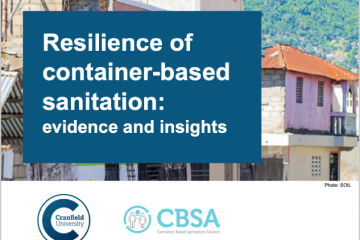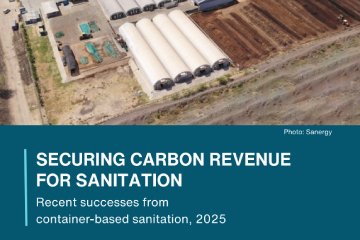The Green Climate Fund (GCF) has developed transformative new guidelines aimed at expanding access to climate finance for sanitation projects. By providing clear, actionable pathways for securing GCF funding, this pivotal development sets the stage for increased investment in sustainable, climate-resilient sanitation solutions that tackle both adaptation and mitigation.
As an active member of the Climate Resilient Sanitation Coalition (CRS Coalition), the Container-Based Sanitation Alliance (CBSA) played a key role in developing the guidelines. Working alongside over 30 organisations within this global network—including practitioners, policymakers, and researchers—CBSA contributed expertise through a collaborative and iterative process that ensured the guidance reflects the latest sector insights and best practices.
A comprehensive framework for climate-resilient sanitation
The GCF’s new guidance provides practical advice on how sanitation projects can align with climate finance requirements. It emphasises the need for integrated approaches that enhance resilience to climate stresses, reduce greenhouse gas emissions, and incorporate circular economy principles—offering much-needed clarity in this rapidly evolving area.
CBS: a recognised approach for dual action on building resilience and reducing emissions
Container-based sanitation (CBS) is highlighted in the guidelines as a robust and adaptable solution that embodies integrated climate resilience principles. Its water-saving design, use of sealable containers, transport modes and frequent waste collection make CBS a resilient service capable of operating effectively during many climate stresses and shocks.
Furthermore, the guidelines emphasise the importance of active management and circular economy approaches for reducing emissions. With active management lying at the heart of the CBS approach and many CBS providers transforming waste into valuable reuse products—such as fertilisers, biogas, and soil conditioners—CBS is a strong candidate for projects seeking to simultaneously build resilience, reduce emissions, and drive sustainable development. The guidelines specifically propose explicit recognition of container-based sanitation as a viable option in policy frameworks to promote safe circular economy approaches.
Paving the way for greater investment in sanitation
Accessing climate finance is critical for delivering safe sanitation. To this end, CBSA has been exploring the feasibility of carbon credits as a mechanism to unlock support. The GCF’s new guidelines, however, represent a significant leap forward by creating clearer pathways to more substantial and targeted funding for the sector.
These guidelines not only open doors for sanitation projects to access GCF funding but also set a powerful example for other climate funds to follow. By demonstrating how to integrate climate resilience, mitigation, and circular economy principles into funding frameworks, they establish a blueprint that could inspire broader systemic change across climate financing mechanisms.
For more information on the new guidelines, see also a collective article by the Climate Resilient Sanitation Coalition: Advancing Climate Finance for Climate-resilient Sanitation on the IISD SDG Knowledge Hub



